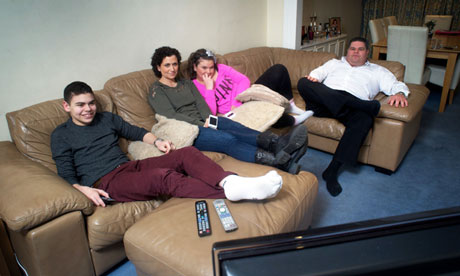
Television is literally a reflective medium: most viewers have had the experience of switching off a programme and seeing their own sofa-slumped image in the empty screen. But, over the decades, TV has tussled with the extent to which schedules should reflect the audience. Gogglebox, a four-part series starting on Thursday night at 10pm on Channel 4, is the latest attempt to incorporate criticism of the programmes within the programming.
Mirroring, deliberately or not, a number of experiments in the 70s and 80s, in which cameras were secretly placed inside sets – revealing, among other things, that viewers are prone to skip the adverts and to have settee sex during boring programmes – Gogglebox films various sets of relatives and friends as they watch the box. Visually, this inevitably echoes the setup in The Royle Family, as the production acknowledges by employing Caroline Aherne as narrator.
In this way, the show settles firmly on one side of the historical divide in the genre of TV-on-TV, which has alternated between formats in which a comic critic rips into the output – from Clive James on Television and Tarrant on TV to Harry Hill's TV Burp – and those that try to include viewers: such as the quiz Telly Addicts, hosted by Noel Edmonds, and BBC1's Points of View and Channel 4's Right of Reply, which directly invited the responses of the watching public.
Combining the two approaches, Gogglebox most resembles one of the clips-and-quips shows in which the comedians eviscerating the output are civilians. We overhear discussions on how long Bruce Forsyth and David Attenborough can keep going and who might replace them. A north-west viewer expresses horror at the thought of Vernon Kay stepping into Brucie's shoes.
There are suggestions that the show has anthropological ambitions, as revealed by the working title, Watch with Britain, which was still attached to the non-broadcast pilot episode made available to previewers. And, in this test edition, there were a few intriguing sociological moments, such as the revelation of the degree of obstetric reminiscence provoked by Channel 4's One Born Every Minute. "Josh, you choked on your mucus," a mother lovingly recalls to her son. And, while these viewers know that they are being filmed and are therefore unlikely to have sex, a wife whisperingly warns her husband "You're playing with yourself!" causing him to pull his hand away.
It will be interesting to note the extent to which Channel 4 uses the four-part series to either promote its own material or to denigrate the schedules of competitors. The sample show was commendably democratic in its attitudes, with viewers shown attentively and weepingly consuming Attenborough's BBC1 show but falling asleep during Channel 4's lengthy documentary on the discovery of Richard III's body in that Leicester car park.
The weakness of the series may prove to be that, in following the Royle Family model, it assumes an old-fashioned manner of viewing. In the pilot episode, all of the participants seemed to be watching on a conventional living room set at the time of the initial transmission. So it will be interesting to see if the screened series explores the increasingly varied times and devices at the disposal of the modern audience. Unless it features someone watching a catchup service on a phone or tablet on the train, Gogglebox will have failed to capture the modern reality of the relationship between consumers and producers of TV.
Even in its depiction of live, real-time watching, the picture seemed backward-looking. Although one of the participants, while cooking a snack, announces that he is going to tweet a photo of his popcorn, there was no sense in the trial show of the increasingly interactive, live-tweeting way in which programmes are approached.
At its best, the concept captures the swings between passivity and passion, time-passing and piss-taking that constitute the viewing experience: many will empathise, for example, with the participants' startled reaction at discovering that a couple who seemed to be mother and son in BBC3's People Like Us were actually lovers. However, on the evidence so far provided, Gogglebox only simulates home-sofa viewing of the traditional kind. The general sense is of a version of The Review Show in which the pundits have watched more popular television.







